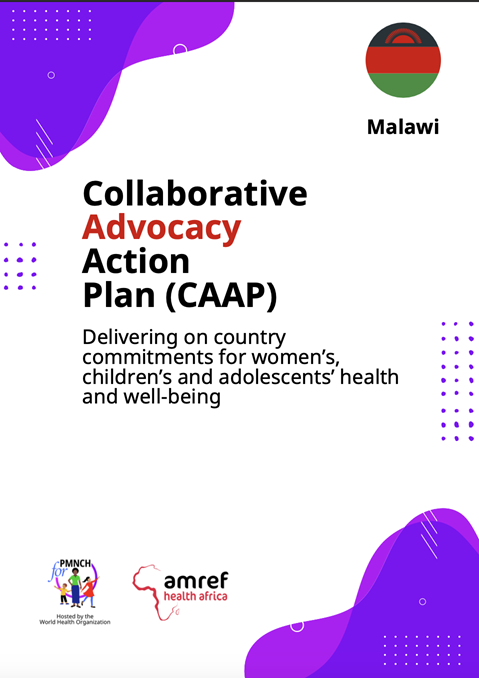Malawi Collaborative Advocacy Action Plan
CAAP

Overview
The development of the advocacy action plan was coordinated by Amref Malawi, under the stewardship of the Ministry of Health’s Reproductive Health Directorate.
The Malawi CAAP initiative aims to enhance coordinated, partner-led advocacy that strengthens the implementation of existing Maternal, Newborn, and Child Health (MNCH), Sexual and Reproductive Health and Rights (SRHR), and Adolescent Well-Being (AWB) commitments.
Malawi is one of 10 countries in sub-Saharan Africa that have collaborated with the PMNCH under the CAAP initiative.
The advocacy plan is a living document, to rally the advocacy efforts of partners, evolving as progress is made and as country priorities evolve. It leveraged the findings from a recent review of national commitments and feedback from discussions with organizations working on women’s, children’s and adolescents’ health, government representatives, and community groups among other stakeholders. These include youth, persons with disabilities, media, and Civil Society Organizations (CSOs).
Together, partners have identified the following five goals to advance advocacy and accelerate progress for women’s, children’s and adolescents’ health:
Increase health financing: Advocate for the government to honor the Abuja declaration to allocate 15% of national budget towards health. Within the national health budget, Ministry of Health to increase reproductive maternal, neonatal, child and adolescent health budgetary allocation to 30% by 2030.
Reduce maternal, newborn, and child mortality: Advocate for the government of Malawi to accelerate progress in reducing maternal, newborn and childbirth mortality, guided by the implementation of the 2024 World Health Assembly MNCH resolution and in line with agreed MNH Acceleration plan.
Reduce unmet family planning needs: Advocate for the Ministry of Health to reduce unmet family planning needs for all women to below 11% by 2030.
Reduce teen childbearing and end child marriage: Undertake advocacy activities for Malawi to reduce teen childbearing from 29% to 20% and end child marriages by 2030.
Ensure youth representation in decision making bodies: Advocate for the government to include 30% representation of youth in decision-making bodies.
Aligned with initiatives including the Every Woman Every Newborn Everywhere (EWENE) and Child Survival Action (CSA) and ongoing advocacy of the Global Leaders Network for Women’s, Children’s and Adolescents’ Health (GLN), the plan’s success depends on collaborative and coordinated efforts of partners. Stakeholders are invited to engage in advocacy actions to advance the health and rights of women, children, and adolescents—leaving no one behind.
Related news piece

.png?sfvrsn=6d0e27cd_1)



